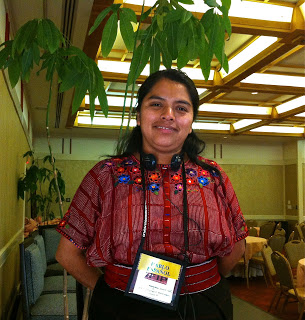Lessons from an Indigenous Woman’s Leadership
Twitter: @ruchachitnis

I had the great honor and joy to speak with Dolores Sales at the International Funders for Indigenous Peoples conference in San Francisco this month. Dolores is an Indigenous Maya Mam woman from Guatemala, who is one of the leaders of National Coordination of Indigenous Peoples and Campesinos (CONIC).
CONIC promotes the livelihoods and community-led development efforts of Indigenous Peoples in Guatemala through a grassroots movement that is also reclaiming their rights to land and other natural resources. Dolores is also an active member of La Via Campesina (LVC), an international movement of peasant organizations, agricultural workers, fisher folks, pastoralists, rural women and Indigenous communities, who espouse food sovereignty as a principle to transform economic power and promote the rights and dignity of small producers.
Dolores is a part of the women’s leadership commission of LVC that is putting the agenda of gender equality and equity in the center of this vital movement, as well as eliminating all forms of violence against women. One of the rallying calls of LVC is the unequivocal belief that small farmers can cool the Earth through the promotion of agroecology.
Dolores is a daughter of farmers, who worked the land as a young girl. She is a part of a larger struggle that is demanding the collective rights of Indigenous Peoples. “Our people want land reforms and territorial defense,” she says. Indigenous women are an integral part of this struggle and work directly with their communities to articulate their demands. “People in my community have little land to cultivate and have to work on large farms and plantations to survive.”
She shares that one of the key demands of women in her community is to have land titles in their names. Another major effort is to promote Indigenous women’s integrated view of development that is based on their cosmology and spiritual beliefs with a deep reverence for “Mother Earth.” She passionately articulates that women’s critical contributions as food producers should be recognized in Indigenous communities and beyond.
I asked her to share her reflections on her personal leadership journey. “Poverty has educated me,” she says. “I learned to listen to our elders, and I have learned much by the collective mobilization of my community that is demanding its rights from the state.” Dolores notes that donors can stand in solidarity with the efforts of Indigenous women by recognizing their role as key defenders of the rights of Indigenous Peoples, as well as the rights of Mother Earth. Dolores also suggests that donors should support spaces for fair trade, as the production of small farmers “has no value under free trade.”
Her final words of wisdom remind us of our “shared responsibility” to protect and defend our planet in peril. Thanks to the leadership of women, like Dolores, donors are slowly recognizing Indigenous women’s agency as grassroots changemakers impacting both—local and policy level shifts.
